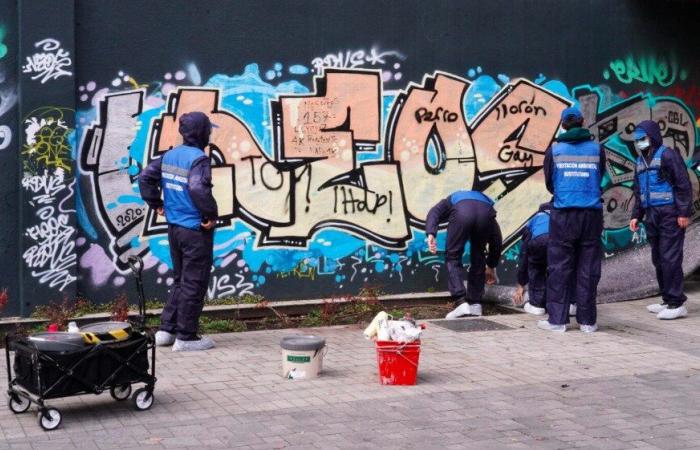
He Madrid City Council has taken a decisive step in its strategy against the graphic vandalism with the implementation of a New protocol that allows authors of public roads to commute their economic sanctions for cleaning work focused on the elimination of painted.
The measure, supervised Monday by the delegate of Urban Planning, Environment and Mobility, Borja Carabantehas already allowed the rehabilitation of 2,625 square meters of damaged urban surface and the switching of 64,100 euros in fines.
The program, in force since December 2024, imposes that the offenders perform works directly linked to the type of damage caused. Thus, instead of generic cleaning work, they must devote themselves to erasing graffiti under the supervision of a tutor-educational. In their first months of application, 33 people have participated to this extent in nine areas of seven Madrid districts.
Young people engaged in urban restoration
The majority profile of those who have opted for this alternative route is marked by the youth: 61 % are between 18 and 29 years old and 15 % are minors. In addition, a third of the participants have university or postgraduate training. 91 % positively values this alternative to economic sanction, and 67 % consider it effective to sensitize about compliance with coexistence norms.
“This protocol not only seeks to restore the urban environment, but also to promote civic awareness among those who damage it”Carabante has stood out during his visit to the district of Tetuán, where he verified the development of a cleaning day in the Plaza de Juan Muñoz with the Cleaning Delegate and Green Areas, green, José Antonio Martínez Páramoand the District Councilor, Paula Gómez-Angulo.
A real impact on neighborhoods
Los 33 offenders They have participated so far have worked between 14 and 60 hours each, depending on the amount of their fine. These actions have been deployed in areas of Fuencarral-El Pardo, Villa de Vallecas, Arganzuela, Hortaleza, Carabanchel, San Blas-Canillejas and Linear City. Cleaning consists of applying two hands of paint on non -porous surfaces, prior protection of urban furniture, to match color and minimize visual impact.
In addition to sanctions switching protocolthe City Council continues to drive complementary measures such as Urgent cleaning service antigraft patrol (Selur), which so far from 2024 has performed 42,259 actions and eliminated graffiti in 379,432 square meters, a surface equivalent to 40 times the main square.
New urban culture based on responsibility
“We want to launch a clear message: Madrid will not tolerate the deterioration of its public space, but we are also committed to reeducation and social reintegration”Carabante has pointed out. In this sense, 82 % of the participants claim to have had a high involvement in the educational nature of the tasks performed, which reinforces the positive impact of the protocol not only at the aesthetic level, but also social and formative.
With this strategy, Madrid not only fights the illegal graffitibut it feels the foundations of a cleaner, participatory and responsible city model, aligning the sanctions policy with pedagogical and sustainable urban restoration.





